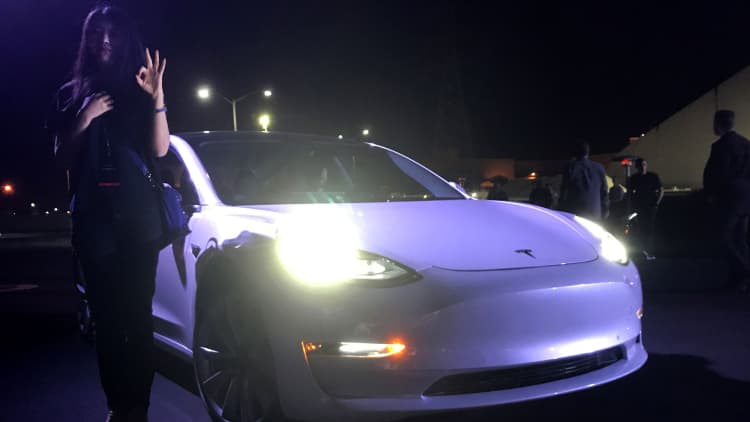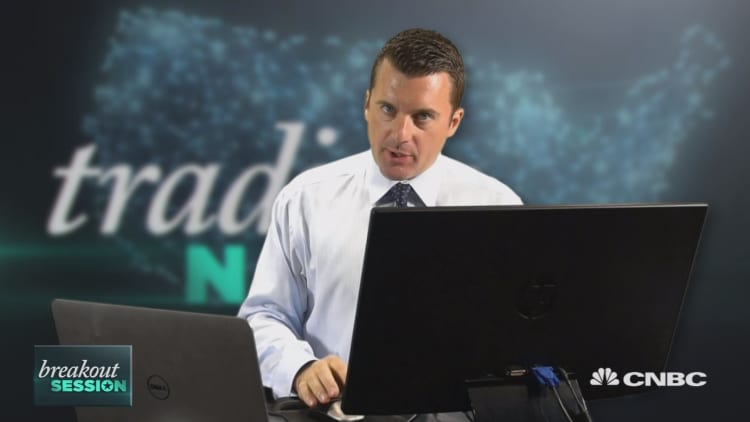
A new survey of Tesla owners continues to fuel one analyst's concerns that the Model 3 may eat into sales of Tesla's higher-end cars.
More than 30 percent of current Tesla owners in recent survey held reservations for the Model 3, according to a note sent Tuesday from Bernstein analyst Toni Sacconaghi. About 70 percent of those with reservations said they are likely to take delivery of the cars.
"Cannibalization by the Model 3 is clearly a risk — the fact that nearly a third of current owners hold reservations raises concerns that the Model 3 may cannibalize sales of higher-end Tesla models upon launch," said Sacconaghi in his note.
The survey questioned 286 Tesla owners in different regions and countries online in July for information on such things as their satisfaction with their cars and service and their likelihood of repurchasing a Tesla.
Sacconaghi also noted two other data points that further support the argument that the Model 3 could threaten sales of S and X models. First, Tesla's inventory has grown "strikingly" in the last two quarters, and some data indicate Model S and X deposits have dropped meaningfully. That suggests "a pause in Model S and X demand leading up to Model 3's launch," Sacconaghi said.
Tesla has said the Model 3 is not meant to be a replacement for the Model S, nor an improvement over it. The company has said the car will not offer the performance and features found on its high-end cars.
The pricing for the Model 3 will vary over its base, depending on the features one adds. At a company event on Friday, Tesla said buyers can pay an extra $9,000 over the base price of $35,000 to get a car with an estimated 310-mile range, rather than the base range of 220 miles.
Meanwhile, Tesla's entry-level Model S — the 75 rear wheel drive — offers an estimated 249 miles, yet starts at just over $70,000. The Model S still may offer other features that will sway buyers willing to accept less range at a higher price, but the potential for some cannibalization is clearly there, Sacconaghi wrote.
Also noteworthy, 20 percent of owners with reservations are "unsure" if they will actually buy the car, and another 7 percent said they are "unlikely" or "very unlikely" to do so, suggesting a "haircut" to Tesla's current deposit total of more than 500,000 could be ahead.
And about 60 percent of all owners with reservations surveyed would be "less likely" or "much less likely" to buy the car if initial quality reports suggest Model 3 has the same kinds of problems that have affected the Model X.
More than a few customers said that they have trouble getting timely and satisfactory service for their cars, especially among Model X owners, the note said.
The owners surveyed visited a service center an average of 1.3 times in just over a year of ownership, and about 30 percent of them had to wait more than 10 days for a service appointment. Just over 20 percent were not able to resolve their problem in one visit to a service station. In fact, 17 percent of them needed three or more service visits to fix their issue, including 24 percent of all Model X owners — a model that has particularly struggled with quality issues.
Tesla CEO Elon Musk acknowledged issues with the Model X at the company's shareholder meeting in June. The experience influenced the car maker's decision to radically simplify the design and customization options for Model 3.
Earlier in the year, Tesla President of Global Sales & Service Jon McNeill said the company would "apply brute force" to improve service. Tesla is in the midst of adding hundreds of approved body shops run by third-party companies and eliminating under-performers from its current network.
That said, the vast majority of Tesla owners love their cars and many say they will never buy an internal combustion vehicle again, the note said.
Tesla appears to inspire the kind of enthusiasm Apple's iPhone generated among its fans and customers, Sacconaghi said. And that's despite the fact that customer service for maintenance and repairs and other issues is a "relative weak spot" for the company.
Sacconaghi found 85 percent of them "love" their Tesla and 84 percent "agree" or "somewhat agree" that it's the most fun car they have ever driven.
And 83 percent of them said that they were either "much more likely" or "more likely" to repurchase a Tesla compared with other cars they have owned.
"Many Tesla owners may never return to internal combustion engine (ICE) cars and while many would consider other competitive electric vehicle (EV) offerings, most appear to be relatively loyal to Tesla, underscoring Tesla's first mover advantage," Sacconaghi said in the note.
WATCH: Why one trader is betting against Tesla



